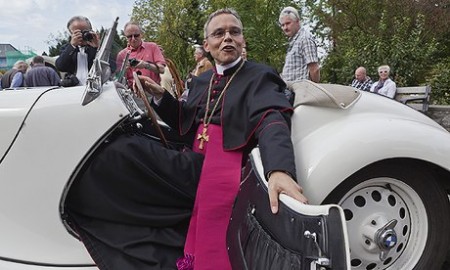File under: Follow the money! Truth is, all bishops have huge slush funds and these guys are showing us only what they want us to see.
By Tom Heneghan
German Catholic bishops are scrapping centuries of secrecy and reporting the value of their private endowments as a scandal caused by a free-spending prelate puts pressure on them for more financial transparency.
Limburg Bishop Franz-Peter Tebartz-van Elst – dubbed “the luxury bishop” – has shocked the Church by admitting six-fold cost overruns on construction of his luxurious new residence, which is now priced at 31 million euros, most of which will be paid from his ample reserves.

His lavish spending clashes with the humble style of Pope Francis, who urges bishops to turn away from wealth and pomp and get closer to the faithful. Francis has also promised to clean up the murky finances of the Vatican’s own bank.
The Limburg scandal has also prompted worried German Catholics to ask what their dioceses were doing.
“We take these concerns very seriously,” Bishop Karl-Heinz Wiesemann of Speyer said in a communique revealing his 46.5 million euro reserve.
German dioceses have secret reserves called the “bishop’s chair” known only to the bishop and a few advisors. Run as a diocesan nest egg and source of funds for special projects, they are not taxed and not listed in the annual balance sheets.
In some older dioceses, “bishop’s chair” reserves include age-old property holdings, donations from former princely rulers and funds from German states over the past two centuries. Their make-up and value vary widely from diocese to diocese.
RICHES AND MORE RICHES?
Cologne, the largest and reportedly richest diocese in Europe, announced on Tuesday “in connection with the current discussion about Church finances” that its archbishop had reserves amounting to 166.2 million euros in 2012.
It said the 9.6 million euro earnings from its investments were, as in previous years, added to the diocesan budget of 939 milllion euros in 2012, three-quarters of which was financed by the “church tax” levied on churchgoers.
A critic of church financial secrecy, Berlin political scientist and journalist Carsten Frerk, said Cologne’s total should be about 1.1 billion euros because its large real estate investments were listed at only nominal values.
“They don’t pay tax so they don’t update their assessments,” he told Reuters. “It’s not in their interest to publish these amounts because then they wouldn’t get as many donations.”
Dioceses also had holdings in other accounts and some even have their own private banks, somewhat similar to the Vatican’s bank, so their full wealth is hard to calculate, he added.
Cologne diocesan officials were not immediately available for comment. Cathedral Provost Rev Norbert Feldhoff told the diocesan radio station it would be hard to explain some aspects of Church finances if all details are published.
“There are big sums and there are problems,” he told Domradio. “We can explain it all to experts, but it could be difficult for the average housewife in Cologne to understand.”
TIGHT-LIPPED
At least six of the country’s other 26 dioceses also opened their books, several showing much smaller “bishop’s chair” reserves but some revealing quite large amounts.
The small diocese of Trier, Germany’s oldest, had a reserve of 84 million euros and said part of its earnings went to pay damages to victims of the clerical sexual abuse scandals that rocked the German Church in recent years.
Limburg, where Tebartz-van Elst’s lavish spending has led to loud calls from priests and parishioners for his resignation, has not posted its reserves. Media reports have estimated the sum at about 100 million euros.
German dioceses have traditionally been tight-lipped about their “bishop’s chair” reserves. In 2010, 25 of the 27 dioceses refused to discuss them when asked by Der Spiegel magazine.
Last week, four of the five dioceses in North Rhine-Westphalia – including Cologne – declined to give any information to the local West German Radio station. By Tuesday, only Paderborn diocese had still not published its details.
Germany’s church tax, collected by the state and handed over to the churches, raised 5.2 billion euros for the Catholics and 4.6 billion euros for Protestants in 2012, making them major economic actors at home and abroad.
Complete Article HERE!
